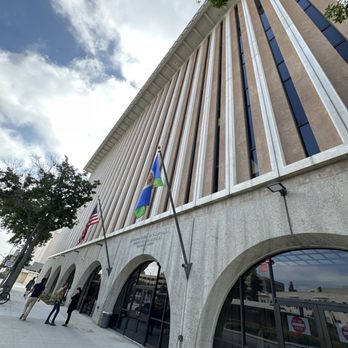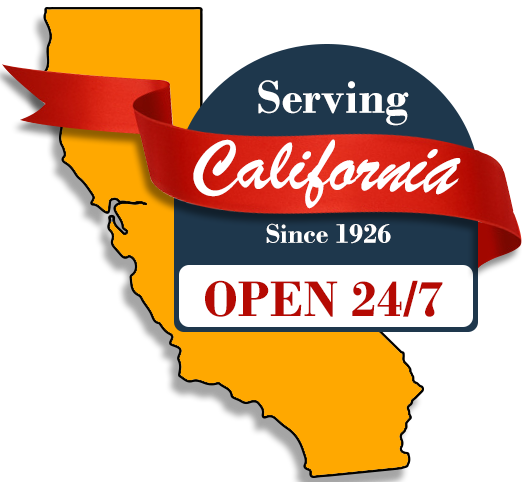Pasadena Courthouse OVerview
Court Address:
- The Pasadena Courthouse is located at:
- Address: 300 E Walnut St, Pasadena, CA 91101, United States
Phone Number:
- For information on cases, hearings, or other court-related matters, contact the courthouse directly at:
- Phone Number: +1 626-396-3300
Hours of Operation:
- The Pasadena Courthouse is generally open:
- Monday through Friday: 8:00 AM to 4:00 PM
- Note: Certain departments, such as the probation office, intake desk, or courtroom services, may operate on limited or varying schedules. It’s best to call ahead or check online for the most accurate information.
Website:
- For case lookups, hearing schedules, and department contacts, visit the official Los Angeles County Courts website: Pasadena Courthouse
This Pasadena Courthouse Overview provides all the essential information needed for visitors and clients, following the same format as the Alfred J. McCourtney Juvenile Center webpage.

Jurisdiction & Case Types – Pasadena Courthouse
The Pasadena Courthouse is one of the key courts in Los Angeles County, handling a broad range of criminal, civil, family law, and traffic cases. It serves Pasadena and surrounding communities such as Altadena, San Marino, and South Pasadena.
Types of Cases Handled:
- Criminal Cases:
- Misdemeanors: Offenses such as petty theft, vandalism, and drug possession.
- Felonies: Serious offenses including robbery, assault, drug trafficking, and gun possession.
- Probation Violations: Cases where individuals are accused of violating the terms of their probation.
- Family Law Cases:
- Child Custody & Support: Disputes over custody and financial support for children.
- Divorce & Domestic Violence: Cases involving the dissolution of marriage, financial settlements, or domestic abuse.
- Civil Cases:
- Small Claims: Cases involving disputes with smaller monetary amounts (under $10,000).
- Landlord-Tenant Issues: Evictions and lease disputes.
- Contract Disputes: Cases regarding the violation of contracts or agreements.
- Traffic Violations:
- DUI (Driving Under the Influence): Alcohol or drug-related driving offenses.
- Speeding & Reckless Driving: Traffic offenses like speeding, running red lights, or reckless driving.
- Driving Without a License: Cases where individuals are caught operating a vehicle without a valid driver’s license or permit.
How Bail Works at the Pasadena Courthouse in Los Angeles
When an individual is arrested in Los Angeles County, they are typically booked at a detention facility such as Pasadena Jail before appearing at the Pasadena Courthouse for a bail hearing. The court will then decide whether the defendant will remain in custody or be released pending trial.
Bail Bonds Process:
At the Pasadena Courthouse, bail is typically set for individuals facing criminal charges. However, in some cases, alternative release options may be granted instead of traditional bail.
Steps in the Bail Process:
Arrest and Booking: The defendant is arrested and taken to Pasadena Jail for processing and booking.
Bail Hearing: The judge will set the bail amount based on the severity of the charges, the defendant’s criminal history, and other factors.
Posting Bail: Armstrong Bail Bonds assists in posting bail quickly to secure the defendant’s release.
Release: Once bail is posted, the defendant is released from custody while awaiting their next court appearance.
Court Appearances: The defendant must attend all scheduled hearings. Missing a court date may result in further charges or a bench warrant.
Factors Affecting Bail:
Severity of Charges: Serious charges such as felony assault, robbery, or drug trafficking will often result in higher bail amounts.
Criminal History: Defendants with a criminal record or prior probation violations may face higher bail amounts or alternative release conditions.
Flight Risk: If the court believes the defendant may not return for future court dates, they may set a higher bail or deny bail entirely.
Community Ties: Defendants with strong community connections (e.g., stable employment, family) may receive a lower bail amount or be granted release on their own recognizance (OR).
Alternative Release Options:
Supervised Release: The court may grant supervised release with conditions such as curfews, electronic monitoring, or regular check-ins with probation officers.
Own Recognizance (OR) Release: In certain circumstances, the judge may release the defendant without bail, trusting that they will return for their court appearances based on their community ties and reputation.
How Armstrong Bail Bonds Can Help:
Armstrong Bail Bonds provides fast, professional, and reliable bail bond services at the Pasadena Courthouse.
We work closely with the court system to ensure the defendant is released as quickly as possible.
Our team is available 24/7 to help families navigate the bail process and secure their loved one’s release.


👩⚖️ Court Appearances & Visitation – Pasadena Courthouse, Los Angeles
Court Appearance Responsibilities:
When a defendant is detained and their case is assigned to the Pasadena Courthouse, they are required to attend all scheduled court hearings. Court appearances are crucial for the case to move forward and to determine whether the defendant will be released, placed on probation, or face further legal consequences.
- Arrive Early: Ensure that you arrive early for your court hearing to allow time for security checks and locating your courtroom.
- Dress Appropriately: Wear formal or business attire. Avoid casual clothing such as t-shirts, shorts, or hats.
- Bring Required Documents: Be sure to bring all necessary documents, such as identification, case-related paperwork, or any forms requested by the court or your attorney.
- Be Prepared: Come prepared to discuss your case with the judge or your attorney, if needed. Avoid speaking in court unless instructed by the judge.
Why Court Attendance Matters:
Court appearances are an essential part of the legal process. Missing a scheduled court date may lead to serious consequences such as:
- Bench Warrants: The judge may issue a bench warrant for the defendant’s arrest if they fail to attend.
- Increased Bail or Denial of Release: If the defendant misses court, the judge may raise the bail amount or deny further release options.
- Delays in the Case: Missing court can delay the legal proceedings, resulting in longer detention or additional legal complications.
Consequences of Missing a Court Hearing:
Failure to appear at a court hearing can result in:
- A bench warrant being issued for the defendant’s arrest.
- Additional charges for failure to appear.
- Increased detention time or more restrictive conditions on probation or bail.
- Delays in the court process, leading to longer stays in custody or more extended legal proceedings.
To prevent these consequences, Armstrong Bail Bonds offers court date reminders and ongoing support to ensure families and defendants stay on track with their obligations.
Inmate Visitation Guidelines (For Defendants in Custody):
If your loved one is detained at Pasadena Jail or another detention facility while awaiting their trial at the Pasadena Courthouse, you may be eligible for visitation.
Visitation Hours & Scheduling:
- Visits must be scheduled in advance.
- Visiting hours may vary depending on the housing unit and facility policies.
- Contact Pasadena Jail directly to confirm visitation schedules and availability.
- Phone Number: [Insert Phone Number]
- Address: [Insert Address]
Visitor Rules & Requirements:
- Valid ID: All visitors must present a government-issued ID.
- Dress Code: Visitors must adhere to the facility’s dress code (no revealing or offensive clothing).
- No Personal Items: Visitors are not allowed to bring personal items such as phones, food, or bags inside the facility.
- Behavior: Visitors must follow facility rules and behave respectfully. Disruptive behavior may result in the cancellation of the visit.
How Armstrong Bail Bonds Can Help:
- Armstrong Bail Bonds offers more than just bail bond services. We assist families by providing reminders for court hearings, helping with visitation coordination, and offering ongoing support throughout the court process.
- 24/7 Support: We are here around the clock to answer any questions and help families stay organized during this challenging time.
Common Charges Handled at the Pasadena Courthouse – Los Angeles
The Pasadena Courthouse handles a wide range of criminal, civil, family law, and traffic cases. Below are some of the most common charges brought before this courthouse, which serves Pasadena, Altadena, San Marino, South Pasadena, and surrounding communities.
Drug-Related Offenses:
Possession of Controlled Substances: Charges for possessing illegal drugs such as marijuana (in certain situations), methamphetamine, cocaine, or prescription drugs without a prescription.
Possession with Intent to Distribute: Charges related to possessing large quantities of controlled substances, suggesting an intent to sell.
Drug Trafficking: Charges for transporting or distributing drugs.
Drug Paraphernalia: Possessing items such as pipes, vapes, or needles used for consuming drugs.
Theft & Property Crimes:
Petty Theft: The unlawful taking of property valued under $950.
Grand Theft: Theft of property valued over $950 or from an individual, such as a purse snatching or car theft.
Burglary: Entering a structure with the intent to steal or commit a crime.
Vandalism: Willful destruction of property, including graffiti or breaking windows.
Assault & Battery:
Simple Battery: The unlawful use of force or violence against another person without causing injury.
Battery Causing Injury: Battery where the victim sustains physical injury.
Assault with a Deadly Weapon: Assault involving a weapon capable of causing significant harm, such as a knife or gun.
Domestic Violence: Violence or threats of violence between family members, including spouses, partners, or children.
Weapons Possession:
Carrying a Concealed Weapon: Possessing a firearm, knife, or other weapon in a concealed manner without a permit.
Possession of a Firearm by a Felon: A convicted felon caught possessing a firearm, which is prohibited by law.
Brandishing a Weapon: Displaying or waving a weapon in a threatening manner.
Driving Under the Influence (DUI):
DUI of Alcohol: Operating a vehicle under the influence of alcohol.
DUI of Drugs: Driving while impaired by drugs, including prescription medications, marijuana, or illegal substances.
Underage DUI: DUI charges for minors under the legal drinking age.
Child Custody & Child Support:
Child Custody: Disputes over the legal and physical custody of children, including joint or sole custody arrangements.
Child Support: Legal proceedings for the financial support of a child by the non-custodial parent.
Divorce & Domestic Violence:
Divorce: Legal dissolution of a marriage, including matters of asset division and spousal support.
Domestic Violence: Abuse or threats of abuse between family members or partners, which can result in restraining orders and protective measures.
Restraining Orders:
Temporary Restraining Orders (TRO): Short-term orders issued to protect an individual from harassment or violence.
Permanent Restraining Orders: Long-term protection orders issued after a hearing, often in cases of ongoing abuse or threats.
Traffic Violations:
Speeding & Reckless Driving: Offenses such as exceeding speed limits or driving aggressively.
DUI (Driving Under the Influence): Alcohol or drug-related offenses leading to the suspension of a driver’s license and possible jail time.
Driving Without a License: Operating a vehicle without a valid driver’s license or permit.
Miscellaneous Offenses:
Probation Violations: Individuals accused of violating the terms of their probation may return to court for a violation hearing.
Violation of a Protective Order: Breaking the terms of a restraining order, often related to domestic violence cases.
Frequently asked questions about Pasadena Courthouse
📍 Where is the Pasadena Courthouse located?
- The Pasadena Courthouse is located at:
- Address: [Insert Address], Pasadena, CA [ZIP Code]
🚓 Where are individuals taken after arrest in Los Angeles County?
- Individuals arrested in the Pasadena area are typically taken to Pasadena Jail for booking and temporary detention before appearing at the Pasadena Courthouse for their hearing.
⏱ How soon does a person see a judge after being arrested?
- A detention hearing typically occurs within 48 to 72 hours of arrest (excluding weekends and holidays). This hearing determines whether the defendant will remain in custody or be granted release pending their trial.
💰 How does bail work at the Pasadena Courthouse?
- Bail is set by the judge based on the severity of the charges and other factors. Armstrong Bail Bonds can assist in posting bail to secure the defendant’s release.
📞 Can Armstrong Bail Bonds help with bail at the Pasadena Courthouse?
- Yes! Armstrong Bail Bonds provides fast and reliable bail bond services for individuals facing criminal charges at the Pasadena Courthouse.
👨👩👧 Can family members attend court hearings?
- Yes. Family members or legal guardians are generally required to attend court hearings alongside the defendant. This is especially important in family law or juvenile cases.
🧾 What happens if a defendant misses a court hearing?
- Missing a court appearance can result in:
- A bench warrant for the defendant’s arrest.
- Additional charges for failure to appear.
- Increased detention time or delays in the case.
👥 Can I visit a family member or defendant while they’re in custody?
- Yes. If your loved one is detained at Pasadena Jail, you may be eligible for visitation. Contact the facility directly to arrange visitation and confirm availability.
- Phone Number: [Insert Phone Number]
- Address: [Insert Address]
💳 What forms of payment do you accept at Armstrong Bail Bonds?
- Armstrong Bail Bonds accepts all major credit cards, debit cards, bank transfers, and cash payments. We also offer remote and in-person payment options for families across Los Angeles County.
🚨 How do I get help from Armstrong Bail Bonds?
- You can reach Armstrong Bail Bonds 24/7 by calling us at:
- Phone: [Insert Phone Number]
- Our team is available day or night to help with your case, explain the bail process, and provide support during this challenging time.



